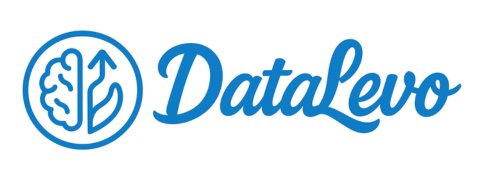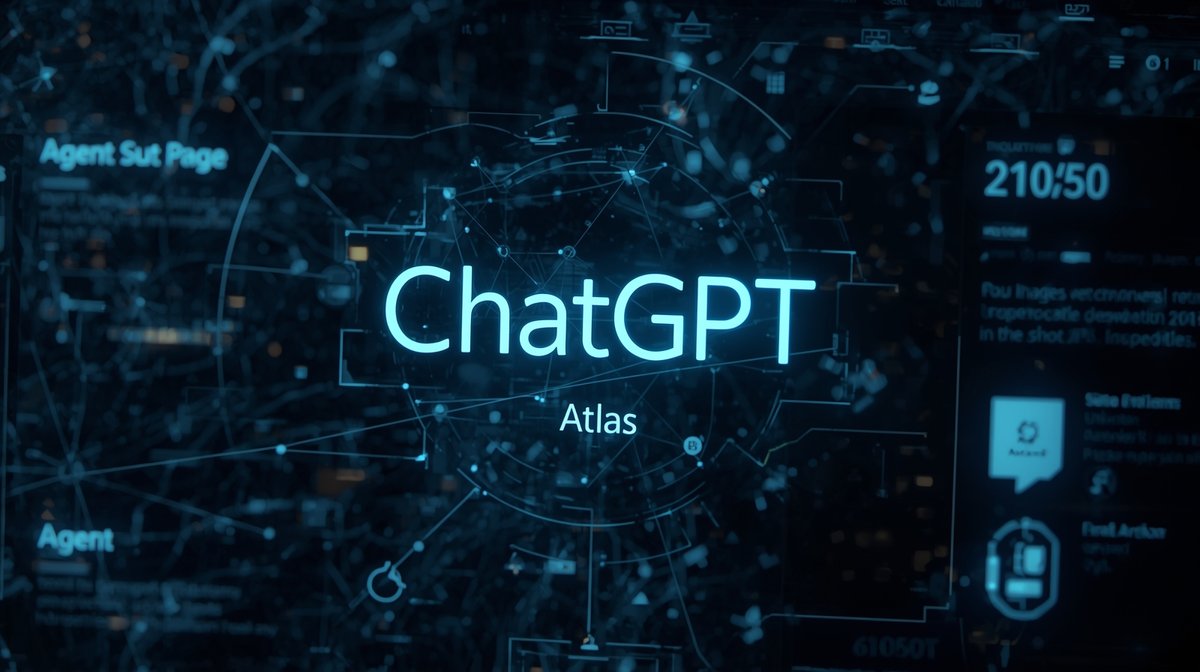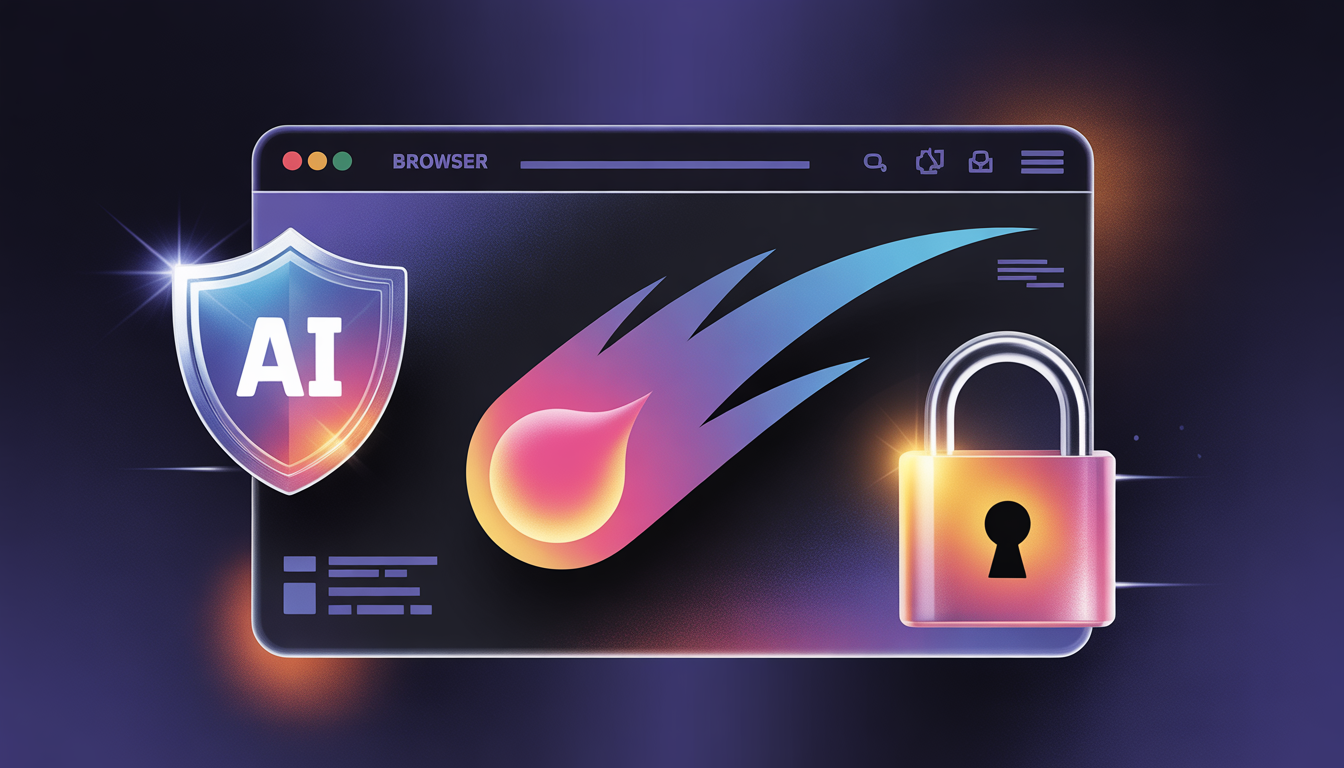OpenAI released ChatGPT Atlas on October 21, 2025, an AI-integrated web browser built on Chromium that embeds ChatGPT directly into the browsing experience. Atlas enables real-time page summarization, contextual queries, and automated tasks such as booking trips or filling forms. Premium users gain access to an Agent Mode for autonomous actions and a Memory feature that personalizes responses based on browsing history.
The launch triggered immediate market ripples — Alphabet shares fell 5%, wiping out nearly $160 billion in market value before a quick rebound. Analysts attributed the brief dip to investor anxiety over how Atlas might challenge Google’s dominance in AI-assisted search. Early reactions praised its productivity potential but also flagged new concerns about data privacy and content attribution.
What Is ChatGPT Atlas?
ChatGPT Atlas is OpenAI’s first standalone browser — not just a chat window with search, but a reimagined interface where AI becomes a core browsing tool. It merges ChatGPT’s intelligence with web navigation, allowing users to ask questions about any page, summarize content, compare products, and even complete multi-step tasks in one window.
Built on the Chromium framework, Atlas feels familiar to Chrome users but includes key differences: a persistent ChatGPT sidebar, integrated memory for personalized experiences, and agentic capabilities that can take contextual actions on behalf of the user.
Our new AI-first web browser, ChatGPT Atlas, is here for macOS.
— Sam Altman (@sama) October 21, 2025
Please send feedback! Availability on other platforms to follow.
Key Features of ChatGPT Atlas
Ask ChatGPT Sidebar
A built-in panel that provides instant, context-aware summaries and explanations for any web page you visit — without leaving the tab.
Agent Mode (Premium Feature)
Atlas’s Agent Mode introduces autonomous browsing. Users can delegate tasks like booking flights, organizing files in the cloud, or filling out complex online forms. This capability marks one of OpenAI’s biggest steps toward “agentic AI,” where the system not only understands commands but executes them safely.
Memory and Personalization
The Memory system stores user preferences and prior interactions to offer continuity across sessions — remembering topics, styles, and browsing patterns. Privacy-conscious users can toggle or clear memory anytime.
Cross-Platform Expansion
Atlas is currently available for macOS, with Windows, iOS, and Android versions in development. Users can import bookmarks, passwords, and browsing history from Chrome or Safari for a smooth transition.
How to Install and Set Up ChatGPT Atlas?
- Visit chatgpt.com/atlas.
- Download the macOS installer and drag it into Applications.
- Sign in with your ChatGPT account (Free, Plus, or Pro tier).
- Import bookmarks and settings when prompted.
- Configure privacy and memory options before first use.
The process takes less than two minutes and ensures all prior preferences migrate securely.
Why ChatGPT Atlas Matters?
Atlas represents OpenAI’s most ambitious attempt to redefine how we browse. Rather than typing search queries into Google, users can now ask ChatGPT directly within the browser, merging discovery, research, and task automation. This could reshape traffic patterns, reduce reliance on traditional search engines, and raise major implications for publishers, advertisers, and SEO professionals.
Alphabet’s Reaction and Market Impact
The release of ChatGPT Atlas briefly rattled markets. Alphabet’s shares dropped 5%, momentarily erasing $160 billion in value, before stabilizing later that day. Analysts linked the dip to fears that AI-integrated browsers could divert users from Google Search.
However, experts also note that Google is rolling out similar features under Gemini for Chrome, suggesting that competition will accelerate rather than displace.
Privacy, Security, and Data Concerns
While Atlas offers time-saving automation, it also introduces new risks. Agent Mode’s ability to act on websites raises concerns about data access, form submissions, and malicious site interactions. OpenAI claims Atlas includes robust privacy controls, allowing users to review stored data and disable memory at will. Still, cybersecurity experts recommend auditing agent permissions before allowing the browser to interact autonomously.
Industry and Expert Reactions
Tech leaders have called Atlas “a paradigm shift in human-AI interaction.” Analysts from McKinsey and Forrester suggest that AI browsers could become the next major battleground after large language models. Some publishers fear AI summarization could reduce referral traffic, while others see opportunities for content licensing and integration partnerships with OpenAI.
How ChatGPT Atlas Compares to Chrome and Edge?
Unlike Chrome, which centers around the search box, Atlas centers around the assistant. Microsoft’s Edge integrates Copilot, but OpenAI’s version goes further — offering autonomous multi-step execution and a memory layer that learns over time.
As browsers evolve from static tools into interactive agents, Atlas may set the benchmark for future “AI-first” browsing.
What’s Next for ChatGPT Atlas?
OpenAI plans to expand Atlas with mobile versions, developer APIs, and custom plug-ins. The company is also exploring business subscriptions for enterprises that want secure, AI-enabled browsing with internal data protection.
If successful, Atlas could become the first mainstream browser to blur the line between AI assistant and web navigator, shaping how billions of people interact with the internet.
Conclusion
ChatGPT Atlas isn’t just another product launch — it’s a signal of where the web is heading. By merging search, conversation, and automation into one platform, OpenAI has set off a new phase in the AI race.
Whether it becomes the default choice for productivity or faces regulatory headwinds will depend on how it balances innovation, safety, and user trust in the months ahead.
FAQs
What is ChatGPT Atlas?
ChatGPT Atlas is OpenAI’s AI-integrated web browser that embeds ChatGPT for real-time page summarization, queries, and task automation.
When was ChatGPT Atlas released?
It launched on October 21, 2025, initially for macOS, with Windows and mobile versions in development.
What is Agent Mode in ChatGPT Atlas?
Agent Mode enables Atlas to perform multi-step autonomous tasks like booking, comparing, and filling out forms.
Is ChatGPT Atlas free?
Yes, it offers a free version, with premium tiers (Plus, Pro, and Business) unlocking advanced features like Agent Mode and memory.
Will ChatGPT Atlas replace Chrome or Edge?
Not immediately — but it introduces a new AI-driven browsing model that could influence how people interact with the web.



